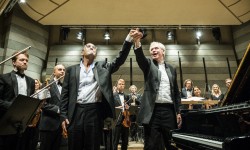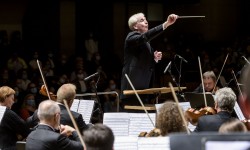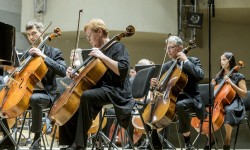CONCERT PROGRAMME
F. Chopin. Krakowiak for piano and orchestra in F major, op. 14
F. Chopin. Andante spianato for piano and orchestra
F. Chopin. Grande polonaise brillante for piano and orchestra in E-flat major
F. Chopin. Piano Concerto No. 2 in F minor, op. 21
***
The Lithuanian State Symphony Orchestra, led by artistic director maestro Gintaras Rinkevičius, together with piano virtuoso Alexander Paley, invites you to the second evening, during which the works for piano and orchestra of the Polish composer and pianist Frédéric Chopin (1810–1849) will be played.
F. Chopin gained worldwide recognition while he was still alive – he became one of the most prominent figures of the Romantic era, whose poetic genius and professional skill had no equal. Like J. S. Bach, whose work was admired by the famous romantic, F. Chopin was a wonderful improviser, and in his music trills and ornaments became not an additional, but a central part of the work. The composer's work was also shaped by Polish folk music, the classical tradition of W. A. Mozart and F. Schubert, and the intimate atmosphere of Parisian salons, where he was a frequent guest and always felt at his best when playing to the audience gathered there.
During his lifetime, F. Chopin wrote more than two hundred pieces for solo piano, but only six of them were composed for piano with orchestra. Tonight, piano virtuoso A. Paley together with the Lithuanian State Symphony Orchestra, conducted by maestro G. Rinkevičius, will perform F. Chopin’s Krakowiak, Andante spianato, Grande polonaise brillante and the Second of the composer's two piano concertos of incredible beauty. Inspired by the first experience of love, F. Chopin wrote both concertos immediately after his studies in 1829-1830 – they were immediately recognized as genius compositions by Warsaw's musical elite. The pieces are carefully perfected – the solo parts are characterized by virtuosity, and the variety of different sound undertones of the piano. Tadeusz Zieliński, the author of a book about the life and work of F. Chopin, writes: "At first glance, the concerto in E minor may seem like the twin of the concerto in F minor: they share a similar style, concept, expression, similar details, ideas and effects. However, there are significant differences between them: the concerto in E minor reveals maturity and perfection, using traditional forms typical of the 19th century music, and in the F minor concert you can hear more original and surprising ideas, as well as a more delicate and intimate sound."
F. Chopin became one of the first music stars – his spectacular music, rebellious views, love stories (among them – with the famous French writer George Sand) attracted public attention, and his early death turned him into a real symbol of the Romantic era. The famous Polish American pianist Arthur Rubinstein, considered to be one of the most famous interpreters of F. Chopin of all time, said: "Even in these times, when feelings have become unfashionable, F. Chopin remains. His music is the universal language of people. When I play F. Chopin, I know that I am speaking directly to people's hearts."




